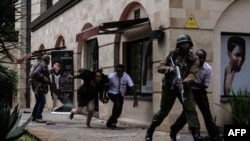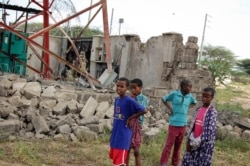One year ago, the al-Shabab militant group attacked a hotel and office complex in Nairobi, killing 21 people. A year has passed, but the memory of that day still haunts those who survived.
Juliet will never forget January 15, 2019. She says early that day, she had planned to call her sister, who worked in Dusit D2 office complex.
“On that particular day, I was like, I was going to call her. Because of where I was, I couldn’t call. Once I am done, it’s when I will give her the call. Little did I know that was not to happen,” she said.
Juliet — who asked that we use an alias — tried to call her sister when she learned that gunmen had opened fire inside Dusit D2. But the call did not go through.
She went to the complex and paced nervously through an area near the attack in search of her sister, hoping she was a survivor.
Half-past midnight, she feared the worst.
“So when we got to Chiromo, the attendant was like we can't allow you to see the bodies now until tomorrow because we need to do few things. But I said, 'please, I am a sister to one of the maybe the deceased, just let me see whoever is there.' He was hesitant. Some security officers were there, one of them told the guy to let us see if there is someone there who is their (relative) let us see, and they confirmed. So that’s when we were allowed to see. When we saw, we identified it was her,” she said.
Juliet's sister was one of the 21 people killed by al-Shabab attackers who stormed the complex.
Kenyan security officers engaged the attackers for 20 hours before ending the siege. At the end of the attack, at least 1,000 people escaped with their lives.
June Chempkemei survived the attack. She was attending a conference in the hotel when they heard sounds of explosion and gunfire. She and six others hid in one of the hotel rooms.
“It was around 5 p.m. Before that we heard several bangs at the door. We had been told [if you hear] any bang don’t open, those are the terrorists," he said. "We heard several such bangs. We were told the security personnel who will come to rescue us would not knock, [they] will simply break in and secure you. At around five the door was broken and a team of rescuers a huge battalion walked in they came and rescued us, and they took us down the stairs step by step. We were hearing shootings all over the place.”
Ronald Ngeno survived the attack, and went back to work in the complex. But the place has never been the same for him.
“Immediately after the attack they increased the security a lot. Right now we feel very secure. However, most of us don’t feel comfortable, for example, to go and have lunch or meals where we know people were killed," he said.
Kenyan authorities were praised for reacting to the terror attack quickly, unlike the Westgate mall attack in 2013, where 67 people were killed.
Kenyan security agencies made dozens of arrests. Some were released after interrogation.
“The government now needs to focus a lot of their attention to prevention and ensuring that radicalization into extremism, the recruitment by al-Shabab among the Kenyan population, is reduced, prevented and stopped,” said Mustafa Ali, a Horn of Africa security analyst.
So far, six people accused of playing roles in the Dusit D2 attack are awaiting trial.
Meanwhile, al-Shabab continues to carry out attacks in the northeastern and coastal regions of Kenya.
In less than a week, al-Shabab fighters attacked two schools in Garissa County, killing four students and three teachers.
The terror group wants Kenya to leave Somalia. The East African nation’s troops are part of the African Union force fighting al-Shabab and providing support to the Somali government.






